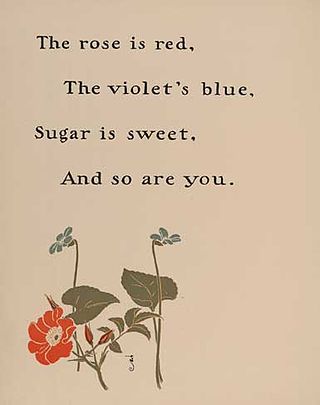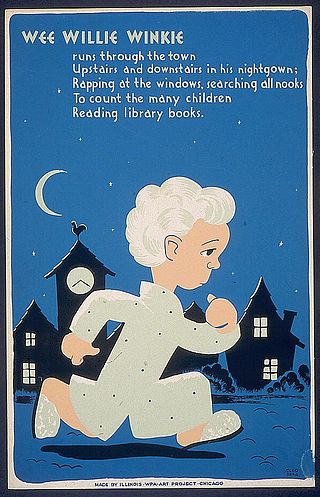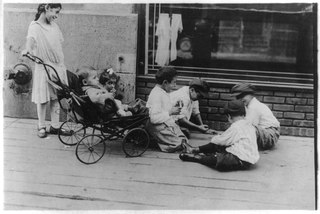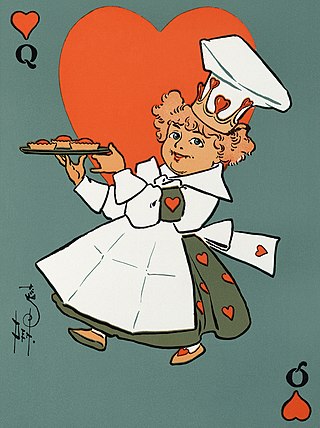
A nursery rhyme is a traditional poem or song for children in Britain and many other countries, but usage of the term dates only from the late 18th/early 19th century. The term Mother Goose rhymes is interchangeable with nursery rhymes.
"Twinkle, Twinkle, Little Star" is an English lullaby. The lyrics are from an early-19th-century English poem written by Jane Taylor, "The Star". The poem, which is in couplet form, was first published in 1806 in Rhymes for the Nursery, a collection of poems by Taylor and her sister Ann. It is now sung to the tune of the French melody "Ah! vous dirai-je, maman", which was first published in 1761 and later arranged by several composers, including Mozart with Twelve Variations on "Ah vous dirai-je, Maman". The English lyrics have five stanzas, although only the first is widely known. The song is in the public domain.

Humpty Dumpty is a character in an English nursery rhyme, probably originally a riddle and one of the best known in the English-speaking world. He is typically portrayed as an anthropomorphic egg, though he is not explicitly described as such. The first recorded versions of the rhyme date from late eighteenth-century England and the tune from 1870 in James William Elliott's National Nursery Rhymes and Nursery Songs. Its origins are obscure, and several theories have been advanced to suggest original meanings.

Tweedledum and Tweedledee are characters in an English nursery rhyme and in Lewis Carroll's 1871 book Through the Looking-Glass, and What Alice Found There. Their names may have originally come from an epigram written by poet John Byrom. The nursery rhyme has a Roud Folk Song Index number of 19800. The names have since become synonymous in western popular culture slang for any two people whose appearances and actions are identical.

"Peter Peter Pumpkin Eater" is an English language nursery rhyme. It has a Roud Folk Song Index number of 13497.

"Little Miss Muffet" is an English nursery rhyme of uncertain origin, first recorded in 1805. It has a Roud Folk Song Index number of 20605. The rhyme has for over a century attracted discussion as to the proper meaning of the word tuffet.

"Little Jack Horner" is a popular English nursery rhyme with the Roud Folk Song Index number 13027. First mentioned in the 18th century, it was early associated with acts of opportunism, particularly in politics. Moralists also rewrote and expanded the poem so as to counter its celebration of greediness. The name of Jack Horner also came to be applied to a completely different and older poem on a folkloric theme; and in the 19th century, it was claimed that the rhyme was originally composed in satirical reference to the dishonest actions of Thomas Horner in the Tudor period.

"Ring a Ring o' Roses", "Ring a Ring o' Rosie", or "Ring Around the Rosie", is a nursery rhyme, folk song and playground singing game. Descriptions first emerge in the mid-19th century, but are reported as dating from decades before, and similar rhymes are known from across Europe, with various lyrics. It has a Roud Folk Song Index number of 7925.

"Baa, Baa, Black Sheep" is an English nursery rhyme, the earliest printed version of which dates from around 1744. The words have barely changed in two and a half centuries. It is sung to a variant of the 18th century French melody Ah! vous dirai-je, maman.

"Roses Are Red" is the name of a love poem and children's rhyme with Roud Folk Song Index number 19798. It has become a cliché for Valentine's Day, and has spawned multiple humorous and parodic variants.

"Wee Willie Winkie" is a Scottish nursery rhyme whose titular figure has become popular as a personification of sleep. It has a Roud Folk Song Index number of 13711.
A children's song may be a nursery rhyme set to music, a song that children invent and share among themselves or a modern creation intended for entertainment, use in the home or education. Although children's songs have been recorded and studied in some cultures more than others, they appear to be universal in human society.

"There Was a Crooked Man" is an English nursery rhyme. It has a Roud Folk Song Index number of 1826.

"Ding Dong Bell" or "Ding Dong Dell" is a popular English language nursery rhyme. It has a Roud Folk Song Index number of 12853.
Iona Margaret Balfour Opie, and Peter Mason Opie were an English married team of folklorists who applied modern techniques to understanding children's literature and play, in studies such as The Oxford Dictionary of Nursery Rhymes (1951) and The Lore and Language of Schoolchildren (1959). They were also noted anthologists, assembled large collections of children's literature, toys, and games and were regarded as world-famous authorities on children's lore and customs.

Childlore is the folklore or folk culture of children and young people. It includes, for example, rhymes and games played in the school playground. The best known researchers of the field were Iona and Peter Opie.
"I Love Little Pussy", alternatively called "I Love Little Kitty", is an English language nursery rhyme about a person who is kind to a pet cat. It has a Roud Folk Song Index number of 12824.
"How Many Miles to Babylon" is an English-language nursery rhyme. It has a Roud Folk Song Index number of 8148.

"The Queen of Hearts" is an English poem and nursery rhyme based on the characters found on playing cards, by an anonymous author, originally published with three lesser-known stanzas, "The King of Spades", "The King of Clubs", and "The Diamond King", in the British publication The European Magazine, vol. 1, no. 4, in April 1782. However, Iona and Peter Opie have argued that there is evidence to suggest that these other stanzas were later additions to an older poem.
Jane Taylor was an English poet and novelist best known for the lyrics of the widely known "Twinkle, Twinkle, Little Star". The sisters Jane and Ann Taylor and their authorship of various works have often been confused, partly because their early ones were published together. Ann Taylor's son, Josiah Gilbert, wrote in her biography, "Two little poems – 'My Mother,' and 'Twinkle, twinkle, little Star' – are perhaps more frequently quoted than any; the first, a lyric of life, was by Ann, the second, of nature, by Jane; and they illustrate this difference between the sisters."













